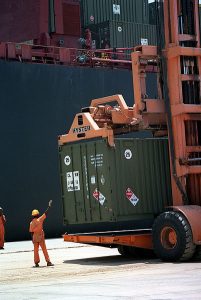ILWU Disrupts West Coast Ports Friday & Continues Labor Action This Week
International Longshore & Warehouse Union (ILWU) labor action shut down port terminals up and down the West Coast on Friday. The labor action actually started on Thursday evening and has continued this week.
While labor action continues to disrupt cargo flow, there has been improvement. Terminals that were basically shut down by the union have reopened. Slowdowns are being addressed, including some union employees getting fired for intentionally decreasing port efficiency during this labor action.
Of course, what we’ve seen since Thursday night is not even close to the first ILWU labor action over the long course of contract negotiations that began in May of 2022 before the previous contract expired July 1st, 2022. Many slowdowns from labor action taking place over the last year, plus a bad history of the ILWU disrupting cargo flow during contract negotiations, leave shippers knowing things can get worse at any moment.
Unfortunately, negotiations don’t look even close to reaching resolution as we’re reaching the international shipping peak season.
Catching Up on Last Week’s Disruption

The disruption last week was big enough it made mainstream news headlines rather than just international shipping news outlets’ stories.
Paul Berger reported in the Wall Street Journal:
A new wave of job actions halted cargo operations across major West Coast ports, with dockworkers effectively shutting down the Port of Oakland for a time and hampering handling at some of the country’s busiest trade gateways in an escalating confrontation with employers over long-running contract talks.
The Pacific Maritime Association, which represents West Coast terminal operators, said Friday that dockworkers were “staging concerted and disruptive work actions” that had stopped or severely disrupted operations stretching from terminals at Southern California’s big container port complex at Los Angeles and Long Beach to Seattle.
Shipping industry officials said dockworkers failed to show up for work and slowed operations at the ports starting Thursday evening and continuing into Friday morning.
“We are moving at half of the velocity that we normally operate with,” an official at one cargo-handling terminal at Los Angeles-Long Beach said Friday. Some terminals in Southern California opened Friday morning and then stopped accepting trucks a few hours later as traffic built up because of the slowed operations.
A spokeswoman for the Port of Oakland, the eighth-busiest container port in the U.S., said the port’s international operations were closed Friday morning and that it was unclear if they would open for the afternoon.
ABC 7 Eyewitness News Los Angeles reported:
The industry group representing shippers announced Friday that operations at some marine terminals at the Ports of Los Angeles and Long Beach were “effectively shut down” following staged concerted and disruptive work actions from the union representing West Coast dockworkers.
The Ports of Los Angeles, Long Beach, and Oakland get more attention because of their size, but similar reports came from other ports, including Tacoma, Seattle, and Hueneme.
Continuing Disruption
Disruptions continued at some terminals in Seattle, Long Beach, and Los Angeles on Monday. Although not as bad as Friday when several terminals from Seattle to Long Beach were closed.

In an update email on the situation I received from All-Ways, they stated:
Disruptions continued at some terminals in Seattle, Long Beach, and Los Angeles on Monday. Although not as bad as Friday when several terminals from Seattle to Long Beach were closed.
Job actions continued sporadically throughout the weekend. This included ship-to-shore crane productivity slowdown. Cranes were operating at 20 lefts per hour or lower when each crane can normally lift about 25 to 26 times per hour.
…
Low productivity by labor gangs who were working four vessels in Seattle caused them to be fired on Monday, an SSA Marine spokesperson said. The SSA also operates three terminals in Long Beach. Since Saturday, two of the SSA terminals haven’t worked on an international ship.
“Union leaders are implementing many familiar disruption tactics from their job action playbook, including refusing to dispatch workers to marine terminals, slowing operations, and making unfounded health and safety claims,” the PMA said on Monday. “The ILWU’s coast-wide work actions since June 2 are forcing retailers, manufacturers, and other shippers to shift cargo away from the West Coast in favor of ports on the Atlantic and Gulf coasts. Much of the diverted cargo may never return to the West Coast.”
Again, even mainstream media had to report on the continuing labor action. Vanessa Yurkevich reported in a CNN Business article:
Two of the six marine terminals at the Port of Long Beach remained closed during the day shift Monday, as “operators of those terminals made the decision to close based on operational needs, and will reopen for the evening shift,” the port said in a statement.
Many similar reports were published yesterday and today.
Bad Sign for Negotiations
During this latest bout of labor action up and down the coast, the ILWU has said it’s not union-wide action. The union has also said that negotiations have not broken down. However, anything the union says has to be taken with a grain of salt. Sudden, simultaneous labor action at various ports from Los Angeles to Seattle can’t be taken as a good sign for negotiations.
I made a big point of the importance of paying attention to the ILWU’s actions over its words back in April, when the union said in a brief statement that agreement had been reached “on certain key issues.” That statement made headlines too. At the time, I said it didn’t mean much, if anything at all. I provided several reasons shippers shouldn’t put much stock in the statement, including its suspicious timing. However, I missed something big about its timing that Greg Miller pointed out this weekend in a FreightWaves article about the current disruption:
… some handicappers [of the odds of contracts devolving into extended labor disruptions similar to 2014-15] would have noticed the timing [of ILWU’s statement]. That announcement came the very day the Biden administration’s pick to lead the Department of Labor, Julie Su, had her Senate nomination hearing. The progress announcement allowed her to tell lawmakers she had obtained positive results after engaging the parties.
Oddsmakers who placed little weight on the April 20 announcement look like they’re right. The betting line just shifted in favor of the large-scale disruption scenario.
Unfortunately, the timing for the increased likelihood of large-scale disruption from the ILWU contract negotiations couldn’t be much worse. We’re coming into the peak season, when importers typically stock for the big Christmas shopping season. This year’s peak season is not expected to be as large as it could be because of economic uncertainty and many retailers still being overstocked, but this is still problematic timing.
At least many shippers have been stocking early or diverting cargo through the East and Gulf Coasts to avoid what has seemed like inevitable labor disruption from the ILWU. I’ve been consistently suggesting such strategies since before negotiations even began because of the sad history of disruption during ILWU contract negotiations.
One problem for West Coast ports is some of that cargo getting diverted to the East and Gulf Coast won’t return to the Pacific side of the country in the future. Investments have and are being made to increase volume capabilities moving through the opposite coast of the country.
Biden Administration Monitoring Situation Is a Joke
This labor action has again caused shippers to plead with the Biden Administration to step in. The All-Ways update email reported:
The National Retail Federation (NRF) sent its third letter to the White House on Monday following the port disruptions over the weekend, urging for intervention.
Universal Cargo’s blog published at least one of the previous letters. However, these letters seem to have fallen on deaf ears. Or blind eyes. Maybe that’s because the head of the administration is an 80-year-old. Or maybe it’s an unwillingness for the Democrat party, with such strong union ties, to prevent union action from happening.
Instead of action, we got Press Secretary Karine Jean-Pierre giving the empty words on Monday that the situation is being carefully monitored. Apparently, it’s being closely monitored the way the Southern border is being closely monitored as millions enter the United States illegally under this administration.
Jean-Pierre echoed the empty words of the ILWU from April that certain undisclosed key issues were tentatively agreed upon. Hey, you’ve got to repeat lines when creating a narrative. Jean-Pierre added the White House is “going to continue to encourage all parties to work in good faith toward a mutually beneficial resolution that ensures that workers get fair benefits, equality of life, and the wages they deserve.”
No worry of losing those union contributions to the Democrats’ political campaigns with statements like that. But shippers can go ahead and keep worrying about their cargo getting held up at the ports.
What’s Holding Up Negotiations?
It’s likely many things are slowing negotiations and increasing labor action from dockworkers. Automation has been talked about since long before negotiations even started as the most likely cause of contention for these negotiations. However, during this round of labor action, wages is what people have been pointing at. While union dockworkers are broadly considered to be very well-paid, the ILWU is looking for quite large wage increases to the point of almost doubling hourly wages, according to All-Ways email:
Over 2021 and 2022, carriers gained record-breaking profits and the ILWU is looking to cash in on some of that. While over the last 20 years wage increases ranged between 50 cents to $1.50 per hour for each year of the contract, the ILWU is demanding a $7.50 per hour for each year of the proposed six-year contract. This would increase the longshore worker’s salaries by nearly 100% over the course of the contract….
The ILWU reportedly wants certain cargo-handling equipment, such as yard tractors, to be handled by two dockworkers. The demand would mean that each assigned longshoreman would work for four hours and get paid for eight. This has been the case for ship-to-shore cranes which require a higher level of skill.
Some have speculated the issue of automation has been worked out between the parties as one of the “key issues” the ILWU said it had reached with the PMA. While I would hope such speculation to be correct, I find it unlikely. The PMA and ILWU have had moments of public debate on the topic, and I think it would be likely to see a joint announcement revealing such agreement on that issue, though they have agreed not to discuss the negotiations with the press.
Still, someone seems to be leaking information as the above wage information isn’t the only tidbit All-Ways shared about the negotiations. The email included this bit on the PMA pressuring the ILWU to come to agreement:
There is usually an unspoken agreement that the PMA will backpay the ILWU to the expiry of the previous contract once the agreement is reached. While the negotiations have been going on under these presumptions, the PMA has reportedly decided not to honor the usual retroactive pay if a tentative agreement isn’t reached by July 1. The PMA is attempting to pressure the ILWU to reach an agreement as negotiations have been going on for more than a year.
There was recent optimism of negotiations reaching resolution within a couple weeks. Well, a couple weeks passed. Then a couple more. That optimism has turned to pessimism. Now instead of questioning if an agreement could be reached in a couple weeks, most are wondering just how damaging these negotiations are going to get.





